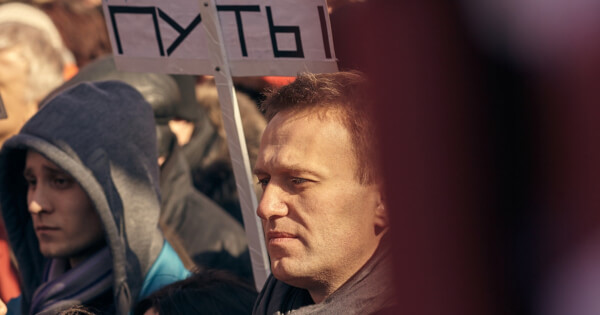Russia’s Detained Opposition Leader Alexei Navalny receives $120,000 in Bitcoin Donations as Protests Rage in Moscow
Lucas Cacioli Jan 26, 2021 04:15
Russian’s are using Bitcoin to support detained political opposition leader Alexei Navalny who was recently arrested on Jan. 17 as thousands protest in Moscow for his release.

Russian’s are using Bitcoin to support detained political opposition leader Alexei Navalny who was recently arrested at Moscow airport on Jan. 17 under the guise of a 2014 conviction.

Since the arrest of Navalny, over 40,000 Russians flooded the streets of Moscow to demand Vladimir Putin’s staunchest political opponent be released over the weekend. Further to the protest—a Bitcoin address associated with Navalny's political party has received $120,000 in support via BTC.
Russia Shows Support Through Bitcoin
Alexei Navalny is a lawyer turned activist who began criticizing Russian President Vladimir Putin in the 2000s. He announced his presidential candidacy in 2016.
On Jan. 17, Russian police in Moscow arrested opposition leader Navalny at the Moscow airport after he had landed from an inbound flight from Berlin. Russian Officials are adamant that the arrest has to do with a 2014 conviction.
According to Reuters, Europe’s top human rights court ruled that Russian opposition leader Alexei Navalny’s conviction for fraud in 2014 had been “arbitrary and manifestly unreasonable” and ordered Russia to pay him compensation. For all intents and purposes—Russian officials now hold Navalny for a crime he has already been acquitted after proving with high certainty that the money laundering charges had been fabricated.
Upon his arrest on Jan. 17, Navalny called for a nation-wide protest and Russian citizens complied in the face of the authoritarian regime, with thousands of protestors pouring in to the nation’s capital. Vladimir Putin has since called the protests both illegal and dangerous. As reported by the BBC, more than 3000 protestors were arrested in Moscow throughout the course of the protest.
Navalny leads the political party ‘Foundation for Combating Corruption (FBK)’ which is a not for profit organization. The group’s “headquarter” website, as linked on FBK’s homepage, does accept donations via wire transfer, PayPal, and Bitcoin.
Since the arrest, the party’s Bitcoin address has received over $120,000 in donations of support—or around 3.5 BTC. In the party's lifetime, since the addition of the BTC donation option, Russian’s have donate a total of 657.1 BTC which equates to over $21 million to Putin’s opponent and the donations continue to arrive at the address.
Leveraging Bitcoin is nothing new in public protests and organized mass operations—reports of Hong Kong protestors receiving Bitcoin donations circulated during the 2019 protest against China’s national security law, and recently it has been reported that BTC donations were made to finance the U.S. Capitol riots.
Navalny and Democracy Under Attack
Since his announcement to run for President in 2016, Navalny has faced severe criticism from the government, particularly for his scathing reports against current President Vladimir Putin.
Navalny has been jailed on account of the reportedly illegitimate charges of 2014 and has been poisoned on several occasions, with the most recent attempt made in August, which sent him into a coma. Exiting President Trump was heavily criticized for appearing to turn a blind eye to the signs of political repression occurring in Russia.
Navalny has since found support from newly confirmed President Joe Biden’s administration, asking for his release.
“We call on Russian authorities to release all those detained for exercising their universal rights and for the immediate and unconditional release of Alexei Navalny,” White House press secretary Jen Psaki told reporters on Monday, echoing a statement from the State Department from over the weekend.
Ms Psaki also reiterated calls for Russia to “cooperate” with the international investigation into Mr Navalny’s poisoning in August 2020 and to “credibly explain” the use of a chemical weapon, Novichok, on one of its own citizens.
Image source: Shutterstock.jpg)